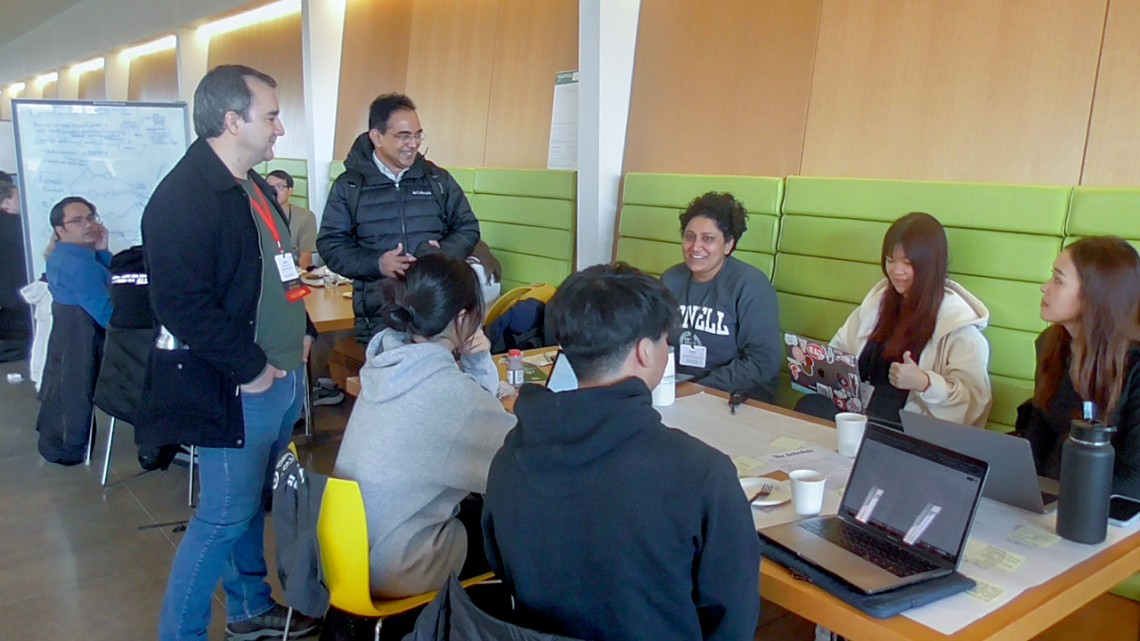
Teams work during the Cornell Institute for Digital Agriculture Hackathon on March 20.
Veterinarian helper wins digital ag hackathon
By Kathy Hovis
Large animal veterinarians – who trek to muddy barns and fields each day to work with their patients – face challenges when it comes to keeping records. Minerva Panda has an idea for a software application that could lead to more complete records, improve working hours for vets and provide valuable data to public health experts sleuthing for the next zoonotic outbreak.
The idea from Panda, a master’s student in information science and systems at Cornell Tech, and her team, is Efficient Vet, which won the grand prize March 20 in the Cornell Institute for Digital Agriculture Hackathon, an all-weekend event that drew 150 undergraduate and graduate students from most of Cornell’s schools and colleges to the College of Veterinary Medicine.
“I heard about this problem during a trip to Israel and saw a unique opportunity,” said Panda, who is from India and knows that vets there also have recordkeeping problems. “We are coming out of a pandemic and zoonotic spillover is a concern, so we thought this could be a small step to streamline some of the data from the veterinarians. This makes it easier for them and could go a long way to help with state level and country level analysis.”
Panda plans to move forward with the idea and said the hackathon validated the need for a product like this one. Other members of her team include Amanda Huang ’26 (Cornell Engineering), Huimin (Mindy) Ling (Samuel Curtis Johnson Graduate School of Management), Allen Ma (Cornell Tech) and Aditya Gurjar (Cornell Tech).
“The joy of the CIDA hackathon is that it brings together students from across the many schools and departments of Cornell – and this year, thanks to the efforts of our faculty directors, significantly from other schools in the Northeast – to work on challenges that affect every person on this planet: essentially, how do we feed a population in the billions in ways that are sustainable for the planet, profitable for farmers and equitable to all?” said Diane Bailey, director of the Cornell Institute for Digital Agriculture (CIDA) and the Geri Gay Professor of Communication (CALS).
Hackathon participants were challenged to use technology to help solve problems in several focus areas: using data science to improve ag management and operations; improving controlled environment agriculture processes; developing tools to help agriculture become more climate-friendly, addressing problems such as greenhouse gas emissions, water shortages, pollution and habitat degradation; creating ideas to address the problem of food waste; or resolving food security challenges that work in simpatico with natural human and animal activities on our planet.
“I was impressed by the diverse and inclusive thinking from our students when they brainstormed technology innovation, translation and commercialization,” said Yu Jiang, assistant professor in the School of Integrative Plant Science in CALS and one of the faculty leads for the event. “They focused on not only hot and cutting-edge techniques but also the aspects that mostly benefit human society.”
The hackathon began March 17 with pitches of possible ideas and team formation, then continued Saturday with teams being guided by faculty and industry mentors whose research related to their area of focus. Sunday morning included demos by each team to a panel of judges, who whittled down the field to a round of nine finalist teams, who pitched their ideas to judges Sunday afternoon.
“We simply cannot have a meaningful event without having both faculty and industry mentors involved,” said Parminder S. Basran, associate research professor, medical oncology, at the College of Veterinary Medicine. “You make better decisions about the project when you hear both the academic and industry perspectives, and the students love getting these perspectives.”
Shree Saha and her team developed her idea for TransportX during the hackathon to help farmers in India connect directly to buyers. From her previous work in the country, Saha discovered that transporting crops is one of farmers’ biggest challenges. TransportX won the award for market readiness.
The platform her team developed allows farmers to post their crops and buyers to search for available products. Using a series of algorithms, the app matches these requests with available transportation.
“It’s like a ride share, except for produce,” said Saha, who is a doctoral student in applied economics and management.
The platform would be available in all of India’s 100 local languages, Saha said, to make it easy for anyone to use.
She hopes to formalize this idea and move it forward. “One of my life goals is to contribute actively,” she said. “Small farmers form a huge backbone of India and I want to be able to do something for them, for that to be my legacy.” Other members of her team include Jennifer Zhang ’24 (A&S), Valerie Setiawan (ENG), Kelsey Liu ’24 (ENG) and David Remel Cruz, a student at California Lutheran University.
The full list of winners can be found here.
Kathy Hovis is a writer for Entrepreneurship at Cornell.
Media Contact
Abby Kozlowski
Get Cornell news delivered right to your inbox.
Subscribe
